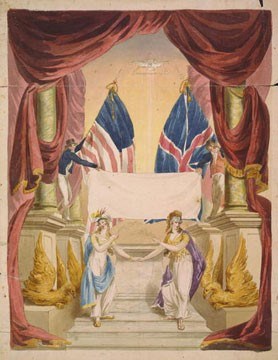
The War of 1812 was a war of choice, not a war of necessity. The United States of America was not directly threatened. The British agreed to stop all trade restrictions with the United States just days before war was declared (although that news did not reach Washington until after war had been declared). The impressment of American sailors on the high seas ceased with Great Britain’s abdication of Napoleon in April 1814. None of the stated aims of the war was achieved by war’s end. Yet this relatively new nation, widely regarded as an upstart, declared war against one of the most powerful nations in the world and the largest, most powerful navy in the world—and it survived. The war lasted 32 months and ended with the exchange of ratifications of the Treaty of Ghent on February 17, 1815. The treaty is referred to as a status quo ante bellum treaty, meaning “the state in which things were before the war.” Neither side won territorial gains, otherwise Maine and parts of the Northwest Territory (the modern states of Ohio, Indiana, Illinois, Michigan, Wisconsin, and the northeastern part of Minnesota) would probably be part of Canada today. But the war did confirm the boundaries between eastern Canada and the United States and set conditions for control of the Oregon Territory. Most importantly, America emerged from the war with a new sense of nationality and enhanced standing among the countries of the world. Ironically, the issues of “free trade and sailors rights,” an American slogan for the war, and regarded as a significant reason for war, are not even mentioned in the treaty. The War of 1812 was the last war the United States fought against an English-speaking nation. Since that war, with the exception of the American Civil War, England and the United States have become close allies. Canada and the United States are close allies, as well. The border between the two countries is the longest international border in the world. It is commonly referred to as the world’s longest undefended border, but this is true only in the military sense, as civilian law enforcement is present. Thus one of the most important outcomes of the war for the United States was peace among the English-speaking nations and the enhanced reputation it gained worldwide. |
Last updated: April 10, 2020
